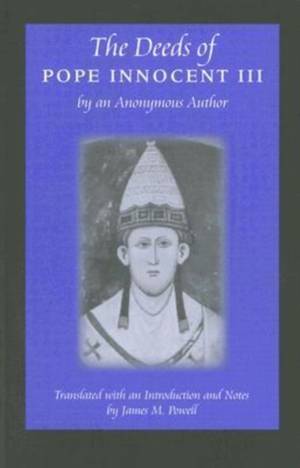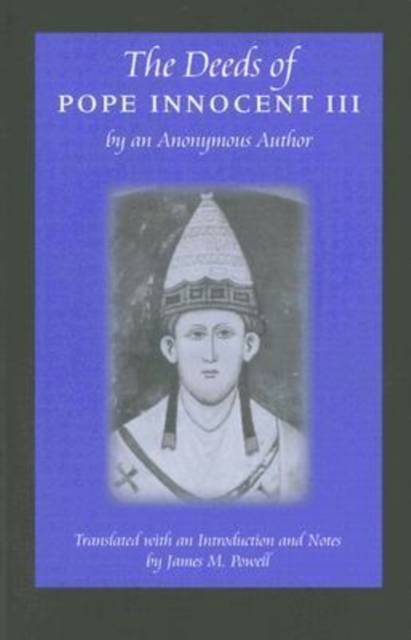
Bedankt voor het vertrouwen het afgelopen jaar! Om jou te bedanken bieden we GRATIS verzending (in België) aan op alles gedurende de hele maand januari.
- Afhalen na 1 uur in een winkel met voorraad
- In januari gratis thuislevering in België
- Ruim aanbod met 7 miljoen producten
Bedankt voor het vertrouwen het afgelopen jaar! Om jou te bedanken bieden we GRATIS verzending (in België) aan op alles gedurende de hele maand januari.
- Afhalen na 1 uur in een winkel met voorraad
- In januari gratis thuislevering in België
- Ruim aanbod met 7 miljoen producten
Zoeken
Omschrijving
The Deeds of Pope Innocent III, composed before 1210 by an anonymous member of the papal curia, provides a unique window into the activities, policies, and strategies of the papacy and the curia during one of the most important periods in the history of the medieval church. Innocent III, who became pope in 1198 and reigned until 1216, has long been regarded as one of the most important popes in history.
This partial biography covering the first ten years of Innocent's pontificate was written by a cleric close to the pope and familiar with the curia. The translator, James M. Powell, suggests that it was written by the canonist and later cardinal Peter of Benevento. Peter had a profound knowledge of southern Italy and closely followed Innocent's efforts to unify the churches of the East and West and to promote the crusade.
Though the discussion of Roman politics found in these pages is one of the most valuable sources available to us, the work has long been neglected and only recently has begun to receive the attention it deserves. Never before has it been translated into any modern language. It is a treasure of contemporary letters, arranged by the author to reinforce his interpretation of the events discussed. The results are new insights that will inspire both students and scholars.
The translator provides an engaging introduction and adds numerous explanatory notes throughout the book. Those who seek a fuller understanding of the development of the papacy during a period of great change in medieval religious history will find this work essential.
This partial biography covering the first ten years of Innocent's pontificate was written by a cleric close to the pope and familiar with the curia. The translator, James M. Powell, suggests that it was written by the canonist and later cardinal Peter of Benevento. Peter had a profound knowledge of southern Italy and closely followed Innocent's efforts to unify the churches of the East and West and to promote the crusade.
Though the discussion of Roman politics found in these pages is one of the most valuable sources available to us, the work has long been neglected and only recently has begun to receive the attention it deserves. Never before has it been translated into any modern language. It is a treasure of contemporary letters, arranged by the author to reinforce his interpretation of the events discussed. The results are new insights that will inspire both students and scholars.
The translator provides an engaging introduction and adds numerous explanatory notes throughout the book. Those who seek a fuller understanding of the development of the papacy during a period of great change in medieval religious history will find this work essential.
Specificaties
Betrokkenen
- Auteur(s):
- Vertaler(s):
- Uitgeverij:
Inhoud
- Aantal bladzijden:
- 334
- Taal:
- Engels
Eigenschappen
- Productcode (EAN):
- 9780813214887
- Verschijningsdatum:
- 1/03/2007
- Uitvoering:
- Paperback
- Formaat:
- Trade paperback (VS)
- Afmetingen:
- 180 mm x 215 mm
- Gewicht:
- 462 g

Alleen bij Standaard Boekhandel
+ 106 punten op je klantenkaart van Standaard Boekhandel
Beoordelingen
We publiceren alleen reviews die voldoen aan de voorwaarden voor reviews. Bekijk onze voorwaarden voor reviews.









